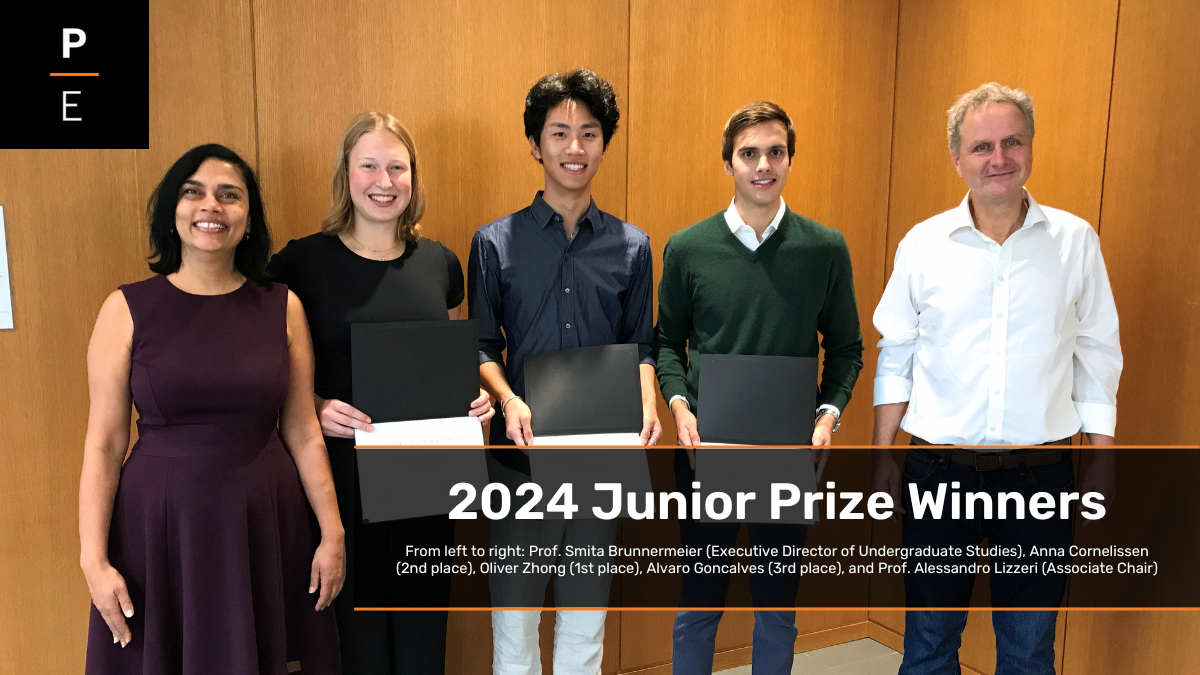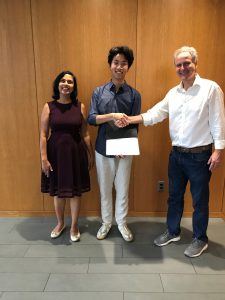Three seniors receive 2024 Junior Prizes for outstanding performance in economics coursework and independent research
The Economics Department at Princeton is celebrating three students as recipients of this year’s Junior Prizes: Oliver Zhong (1st place), Anna Cornelissen (2nd place), and Alvaro Goncalves (3rd place).

These highly selective prizes recognize students who excelled in challenging economics coursework and in their Junior Independent Work (JIW).
JIW research helped 1st-place winner Oliver Zhong “decide on [his] current career plan.“
Earning a Junior Prize is a prestigious recognition of a student’s high GPA and an outstanding junior independent work (JIW).
1st-place prize winner Oliver Zhong had to creatively overcome challenges while writing his junior paper, titled “The Effect of Household Registration System Stringency and Reform on Migrant Worker Incomes in Chinese Provinces, 2010-16.”

Zhong chose the topic after learning about the hukou system in ECO 434: The Political Economy of China, Past and Present and “wanted to see whether the effect of the system on their wages was indeed negative and if [he] could quantify that effect.”
Zhong shared that his research process involved “a literature review, finding data sources that best captured [the] variables of interest, lots of data cleaning, and then running the appropriate regressions.”
When Chinese data protection laws threatened to eliminate the usefulness of an important dataset, Zhong didn’t know if he could find a way forward. Determined, he asked his advisor for guidance and they developed a solution together.
Now complete, Zhong says “the JIW increased my interest in China’s political economy and current economic difficulties. This helped me decide on my current career plan, which is work at a macro hedge fund that does lots of interesting research into China.”
Advice for other student researchers
Now in their senior year, this year’s Junior Prize winners shared some advice for students at the beginning of the independent research process.
For Alvaro Goncalves, whose paper is titled “The Effect of the Golden Visa Program on the Price Evolution of Residential Real Estate in Portugal,” working on his JIW shaped his desire to “develop new perspectives on the world, anchored in solid academic knowledge.” Goncalves is pursuing a Minor in Finance through the Bendheim Center for Finance.
“Choose a topic that aligns with your interests and encourages you to explore new perspectives.” When asked if his interest in finance informed his topic choice, Goncalves confirmed that it did. “Real estate is a critical asset class, and I focused my JIW on understanding how political decisions impact its fundamental drivers of value. Through my BCF finance courses, I gained tools to analyze how policies—such as tax reforms or subsidies—shape interest rates, risk, and, ultimately, the value of assets.”
Additionally, Goncalves advises students working on their junior paper to “ensure you can gather sufficient data points from reliable sources to support your analysis effectively. At the same time, maintain a critical view on how your data was collected, any biases it may introduce, and be mindful about validating your results to ensure they are academically sound.”
Anna Cornelissen, whose paper is titled”The Effect of Interstate Renewable Energy Certificate Trade for Compliance with Renewable Portfolio Standards on State Renewable Energy Generation,” was inspired to study the economics of the renewable energy transition after taking an Environmental Economics class with her JIW advisor, Professor Smita Brunnermeier.
Cornelissen encountered challenges when she began searching for reliable state environmental policy data. By leaning on her advisors and utilizing the resources at her disposal, she was able to meet with state energy representatives to clarify the details of their policies.
“Trust yourself and rely on the resources around you. There truly are an abundance of resources available to help you succeed. Additionally, I would advise students to use their advisor to help select and delimit a feasible research project. Having advised many research projects, your advisor has great perspective on what feasible goals are for their students and can help you set yourself up for success.”
Zhong—who is also pursuing a Minor in Finance—encouraged students to start reviewing literature early while also staying up to date on new research, as something important may be published later in the process. He also highlighted the time consuming nature of working with data, especially when you run into unexpected roadblocks.
“In January, three months before my JIW was due, I found a freshly published paper that was very similar to my JIW (though the authors did more of an event study) and offered helpful insights and references to other relevant research that I’d initially missed.” He added, “However long you think data cleaning is going to take, double or even triple that. There are all kinds of unexpected irregularities that you’ll need to deal with, and often there’s not a clear right or wrong way to clean some variables. Work with your advisor, always check summary stats, and read data documentation carefully!”
Thinking back on the dataset challenge he encountered, Zhong advised, “If you get stuck on a seemingly insurmountable data problem, ask your advisor for help! Chances are they’ve encountered it before and know a solution. Don’t immediately give up and try to find a new dataset.”
For more advice, information, or resources on Junior Papers, visit the Junior Independent Work (JIW) page on the Economics Department website.